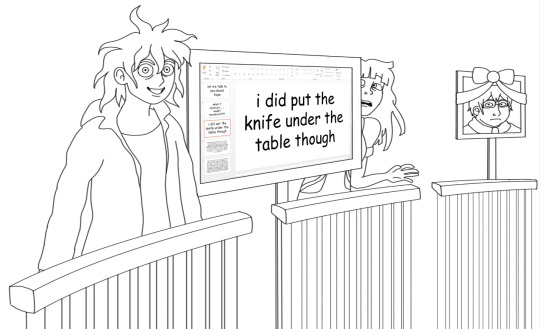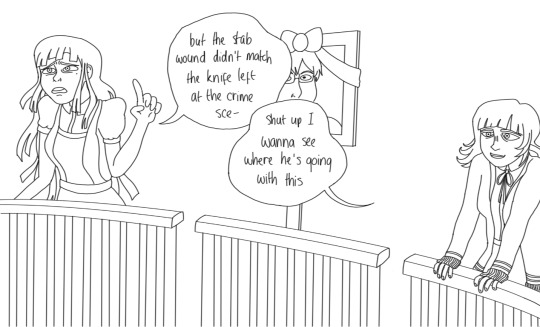#i think my biggest achievements in making these was being able to condense the trials into a few basic panels
Photo







chapter 1 trial
#i think my biggest achievements in making these was being able to condense the trials into a few basic panels#each trial ended up needing more n more dialogue but seeing how long the in game trials are im pretty proud of myself#i only did ever sketch out the first three trials tho my sketches have taken me just up to the chapt 4 trial which i ever started at all#oh also i made sure to always keep the order of the characters in the trials true to the game#everyone is placed in the exact same 'seats' as they are in the real game#that was tough at times bc sometimes i wanted dialogue between characters who were nowhere near each other#but it was also a good opportunity to make me use characters i normally wouldnt have thought to use#and i couldnt just give dialogue to my favourite characters lol#and sometimes it worked out really well where the characters i wanted interacting did happen to be next to each other#sdr2#super danganronpa 2#ok here we go#hajime hinata#teruteru hanamura#mikan tsumiki#chiaki namani#nagito komaeda#peko pekoyama#is that everyone#mahiru koizumi#there we go#my art
996 notes
·
View notes
Text

Introduction
With mocks all over now and the run up for GCSEs well underway in my school and many others, it’s got me thinking about last year when I was in this position like all the year 11s this year. I remember it being such a stressful and quite obscure thing because I had never done external exams before and I didn’t really know what to expect. I thought I would share some of my own experiences and advice and maybe quash some myths. I hope this will help and if anyone has anymore advice or specific questions feel free to message me or add a comment below.
Also while I will be focusing on GCSEs because they are exams that I have experience with, a lot of this advice will apply to other exams so don’t be put off!
*disclaimer*
these are just my own experiences with GCSEs and therefore are by no means universal. I have tried to draw from the experiences of friends and other people I know as well but everybody is unique so not everyone is going to be the same. BECAUSE OF THIS, not all of the advice will suit you and the way you learn. But I would suggest that you try at least a few of the tips just to see if it works.
Mocks - What do I do with them?
By this point, I think everyone will have done their GCSE mocks and probably have their grades back for them. Mocks were a very stressful experience for me because I hurt my hand literally the night before my first exam so I could barely write and I was in a lot of pain for the whole week of doing them. Because of this, I got very very stressed and then started to get worried that the same thing would happen in my GCSEs.
This leads me into my first point mocks are not the real thing: they are very much a trial run and I would say that nothing can really compare to the real exams. By the time you get to your second or third actual GCSE exam you reach a point where you don’t even think about the actual process of all the stuff you have to do before the exam because you are so focussed on the information. Furthermore, if you get grades that you are disappointed with, try not to be worried by that because they, in the grand scheme of things, do not matter
Do - learn from where you went wrong
Don’t - see a mock grade and get stressed out that you are going to fail the whole subject at GCSE
I know this is very easy to say but genuinely lots of people I know went up at least one grade from their mocks. Your mock grade is not an iron clad prediction of what you will get at GCSE
Now that you have got your grade, what do you do with the exam???
First, all of my teachers gave us back the paper to look through and then went through the mark scheme for each questions. THIS WAS SO SO HELPFUL!
If you get the paper, and you get a bad grade or one that is lower than what you were expecting, this is what I would you suggest you do:
Take a deep breath
Remember that this is only your mock grade not the final thing
Resolve yourself to actually learn from this
Read through the paper: did you make a silly mistakes? Did you keep making the same mistakes? Was there a particular question and topic that you lost lots of marks on?
Make notes on the mistakes
Ask the teacher to either give you the mark scheme or through the paper with you - I personally found this really useful because a lot of the time you can use the mark scheme to make notes for each topic and write processes, definitions, etc, using exactly what they want
Make a list of the topics that you found particularly difficult so that these can be your priority for revision
Key point - use your mocks as the spring board for your revision. They are there to point out any weak areas of your knowledge.
Pre-Study Leave Revision - “I haven’t done anything!”
After mocks I planned to get very serious with revision. I was going to dedicate 5 hours a week for all my revision during school time. In the Easter holidays i was going to stick to my revision timetable and I was going to do 6 hours a day. I was going to finish all of my notes for all of my subjects by the end of the Easter holidays.
I did not manage to do ANY OF THAT
My biggest advice for revision before study leave is to give yourself a break. Remember that you are still in school and are in probably the most stressful school year you’ve had yet.
You need to prioritise your studying and use your time wisely rather than put impossible standards on yourself which only make you more stressed when you can’t achieve them.
What should your priorities be:
Do you have any exams before study leave starts? If so, dedicate a little bit of time each weekend to revise that. For me, these were my German and French oral exams and these were the exams people in my school got most stressed about so make sure you’ve had plenty of practise
HOMEWORK!!! This may seem odd because at this point you may be thinking that your teachers shouldn’t be giving you homework and should just let you revise, but actually the homework they give, in my experience, can be really helpful. It is basically revision but you also know that someone is probably going to check whether you’ve done it so you’re more likely to actually do it
If you have time, but DON’T stress yourself trying to make time, do some past papers or make some notes
Revision Techniques: Past Papers vs Notes
Which method is better?
Honestly, neither. In fact you need to use a mixture of both to get the best out of your revision.
Note Taking
Pros:
writing out information is a good way to learn it
you need to know the information at least vaguely to properly be able to do past papers
it’s more studyblr aesthetic
Cons:
it’s very time consuming
you could be focusing more on making the notes look pretty than actually absorbing the information
there is the danger that you could spend so much time learning the information that you don’t actually have time to practise exam technique
Past Papers
Pros:
exam technique and learning to recognise what the question is asking for is really really important
you need to be able to practise doing the papers under timed conditions
you can start to see trends in the types of questions that they put on the papers
Cons:
they’re pretty difficult to do if you don’t know the information
sometimes it can feel like you are just answering questions rather than actually learning and revising
it’s a lot harder to refer back to the past papers to check information
As you can see, there are pros and cons to both so you can’t just rely on one method to get you through exams. here’s how I combined the two to maximise my revision:
I downloaded/printed off the specification for each of my subjects
I went through all of my class notes to see if there were any gaps in my class notes compared to the specification - if there were I would use my textbooks to make notes on it
Go through the specification again. Rank (eg through traffic light colours) each sub-topic on how confident you feel with it. [note: think carefully about this one and actually be honest with yourself. It’s very easy to just think you don’t know anything and make it all red- but in reality you are going to know quite a lot)
Make notes on your worst topics. And try to make notes in a way that is actually constructive and lays it out in a way that you can conceptualise it more. For example, in chemistry, I just could not ‘rates of reaction’ to click. It was one of the easiest topics but for some reason I could never answer the questions right so I make a mind map (before I had just written bullet points) and condensed my notes to one A4 page so I could refer to one the most important pieces of information.
Once you have finished making notes on your worst topics, do two past papers without any notes
Go through the past papers completely with the mark scheme. In a different colour pen to the one you wrote with, actually write the answers from the mark scheme on the past papers
Then, make your notes for the topics from the past paper mark schemes. For example, in biology, which has loads of content to learn, I would write processes, such as protein synthesis and generic experiments, using all of the key words given in the mark scheme. This meant that I always would hit all the key marks
Repeat this for each past paper you do and eventually you will see that you are no longer losing marks
Why this works:
You are making sure you know enough before starting the past papers
You are practising exam technique
You are making notes on the gaps in your knowledge using exactly what examiners want- which means lots of marks
Because you are doing lots of past papers, you can start to see themes and trends in past papers and the types questions that come up all the time
Study Leave
before my study leave, I didn’t think I would get much work done because I had been so bad at doing work and focusing on revision In half term and Easter but here’s a little bit of reassurance if you are thinking along the same lines as I was: study leave is completely different to a half term
I’m not entirely sure what exactly makes it so different but for me and pretty much everyone I know, it wasn’t actually that difficult to revise and stay focused during study leave. Maybe it’s because all you really have to think about are GCSEs or maybe it’s the sort of adrenaline of exam season but I was able to be more focused than I have ever been before.
Here’s my tips to help you:
Stay off your phone: you can either use an app like forest to make sure you stay off your phone during revision time or just turn it off completely
Prioritise your study schedule: there is no point studying for a biology exam that you have in three weeks if you have a history exam this week
Prioritise your studying: there is no point studying a topic that you already know like the palm of your hand if there are three other topics that you are not sure on
Stay hydrated and well fed: have healthy study snacks and lots of water. Also don’t feel bad if you need some more unhealthy snacks As a treat after exams or after finishing a particularly long day
Get a good night sleep as often as possible: taking GCSEs is extremely tiring. I can’t tell you the number of times I came home after a long day or week of exams and just completely wiped out. So it’s really important to sleep as much as possible even though I know pulling that all nighter is very tempting
Lean on your friends and others in your year: everyone is going through the same thing and there is also going to be someone who can help you. I found GCSEs to be one of the most uniting experiences in my school life
Summary
Use mocks to find the gaps in your knowledge
Before study leave, don’t set unrealistic revision goals, instead focus on completing homework
During study leave, use a mixture of notes taking and past papers to revise
Use past paper marks schemes to guide your notes
Prioritise your studying during study leave
Sleep well and stayed healthy
I hope this was helpful and if anyone has any other questions or more tips feel free to reblog or send me an ask/message
- Sophie x
#studyblr#i hope this was helpful#mutuals please rb#text post#study advice#study tips#gcse#gcse studyblr#gcse tips#study life#study guides#study desk#study motivation#study aesthetic#high school student#student tips#student life#uk studyblr#problematicprocrastinator!#idiotacademia#einstetic#eintsein#heycoral#heyreva#heyharri#heypooh#heyindia#heypat#adelinestudiess#notes
269 notes
·
View notes
Text
Animation Vs Live-Action: Which Is Right For Your Project?
When it comes to deciding between animation or live-action video, there are a lot of factors that should be considered. For example: What do I want the viewer's experience with my project? Will this particular format suit our company’s branding?"
You might think there are wrong or right answers when it comes to video creation, but the truth is that both have their merits. It all depends on what you want your content and audience members learn from this project- whether it's something personal like how a person deals with stress in her life as well as informative such aspects of climate change they're struggling not only environmentally; mentally/physically she’s having trouble too because everything around seems so unstable? You decide which direction will make most sense for YOU!
We have compiled a list of the pros and cons for both video formats, so you can make an informed decision.
Costs of Producing Video Content
First things first – let’s talk about money. Whether you want to make a short, low-budget video or go all out with an in depth production plan for your business idea and need more than 15 minutes of footage; it's important that whatever format you choose is as cost effective as possible without sacrificing quality of workmanship (or getting overcharged).
If we're talking strictly length: Short videos can be done within budget constraints while longer projects require additional investment which could result from launching high ticket affiliate products like software development packages on commissionable contracts but beware -these are not necessarily cheaper options if there isn't enough time before launch!
The idea of animation being the cheapest option is a misconception. It might seem like you can just grab some video equipment and quickly make your movie, but actually creating intricate graphics that are cased in 3D requires state-of-the art technology which could cost more than expected!
The costs of creating an animation can be higher than those for a live-action video, depending on the complexity of your project. And we haven’t even touched upon pre-production planning stages such as scripting and storyboarding which are often required before putting together any kind of scene in animated films.
The financial drawbacks of live-action are many. For one, you need to think about insurance and wardrobe for your cast members which can be expensive without using office space as set or ropes in colleagues from other departments willing enough to do some acting on demand.
Animated Video Content Pros
Animation is a versatile and creative way to tell your company’s story. With different styles, formats, or animation styles available for you to choose from there are endless possibilities in video marketing that can be explored with this medium.
Video marketing can be a complicated process, but it doesn't have to feel overwhelming. Hiring an agency with experience in video content will give your company the flexibility and expertise needed for success.
Animation is a great way to condense information into bite-sized chunks. By using animation, it's easy for the viewer (and sometimes listener!) to digest complex and abstract concepts in an entertaining format that will hold their attention from beginning until end.
When you're presenting data in a video, it's important to think about what kind of animation will best make your point. Animation can help with knowledge retention by 15% -- so if there are lots of complex graphs and charts involved then an animated format may be for the job.
Animated videos are a great way to tell stories. They can be made quickly and easily with the click of a button, so you don't have any negative impacts on your time constraints like other media might do. Plus they're really easy for last-minute changes! You'll never regret investing in this type of animation because there's always something new coming out that will inspire creativity or get people engaged again - just check YouTube trends today.
These very quick updates will also benefit you in the long run. Animated video content can last for years, so it's best to start with an updated version of your product rather than producing a new one every time there is something worth updating.
Animated Video Content Cons
This is why you should always include that human touch in your content marketing strategy. Animation can be great for promoting physical products or services, but it might not work so well if what’s being promoted has no tangible aspects of itself whatsoever - like an app on a phone.
As you know, different audiences have very specific needs and expectations. In order to be sure that your video will resonate with the people who are most important - namely those viewers at home – it's essential that their particularized interests/goals also come through in content marketing strategies such as voiceovers for videos created specifically by advertisers themselves (such as commercials).
Creating an animated video can be a time-consuming process, depending on its complexity. If you're in need of one quickly and have no other options available to use as production equipment, it might not work out well for your content because there are lots of things every filmmaker must think about before they even start filming.
Animated videos are a great way to get your message across quickly and without running afoul of copyright laws. A good idea is not always enough when you're developing content for an entire channel, though; pre-production planning helps make sure every aspect goes exactly as planned so the process can be more successful overall!
Pre-production plans tend towards detail in order that creators know precisely what they want their animated video or series about before too much time has passed spent creating it--especially because there isn't room left over on site.
Live-Action Video Content Pros
The power of live-action video content is an undeniable reality. Real people advertising a tangible product has been proven to be highly persuasive when marketing products or services, especially with how shareable videos are nowadays! You want your target audience as much involved in it so they can't help but react and take action on what's being presented - which means you need someone who looks like them delivering this message for maximum impact.
The following is an example of a live-action video.
A: With the flexibility to play with viewers’ emotions through authentic, instructive content and help them envision your company culture, what better way does one sell their product or pitch business? This gives you more credibility in not only selling but promoting as well because it promotes who YOU are!
One of the biggest advantages to live-action video content is that it doesn’t take as long. Whereas with animation, every detail must be built from scratch before production even begins; in contrast you have all physical props and people needed for a quick shoot on site which dramatically reduces time spent prepping ahead of schedule or finishing up post processing later (if done at all).
If your project needs very little in terms of casting and apparatus, a video camera on your mobile phone can do the trick. This may not seem like much at first glance but it has huge benefits that would be hard to come by otherwise; including being able to create high-quality products without spending too much time or money.
Live-Action Video Content Cons
A live-action video is also a challenging project because it takes more time and effort in post production. If you want to film an additional scene, or change dialogue from one part of the footage for another then this would require all new shots which could be difficult at best given how quickly things move when filming outdoors without sound equipment present.
Why do you want to go through the trouble of renting out more film days? It's not like this is going to be an easy process. Plus, all that costs money! Animations are simpler and quicker--plus they can be done in a matter of minutes with our software as opposed to live-action videos which take much longer because it takes being able edit video content by hand (which isn't something everyone has time for).
With so many people involved in the production of your video content it can be overwhelming. You'll need to hire crew, cast and equipment for each aspect that carries a cost; not just when you're filming but also afterwards if needed.
Successful sourcing of the right talent can be one of the most stressful parts about filmmaking. It's important to understand what you want your video to achieve, because if it isn't clear then there won’t ever really be any progress made and we end up stuck wondering where things are going wrong without knowing why this happened in advance.
Final Thoughts
We can help you understand your brief and devise an effective video to reach your target audience. We have years of experience in condensing complex, abstract subject matter or personifying products with personality for more engaging content that will engage viewers on all levels - whether it's professional-sounding verbal communication from one individual about their company/product line; dramatic reenactments following narratives we designed especially tailored towards different audiences like children’s programming (with educational lessons) where they show how things work through trial & error until achieving success at last.
We are a leading animation studio in Toronto. Our services include 2D and 3D animation, storyboarding, character design, visual effects and more!
1 note
·
View note